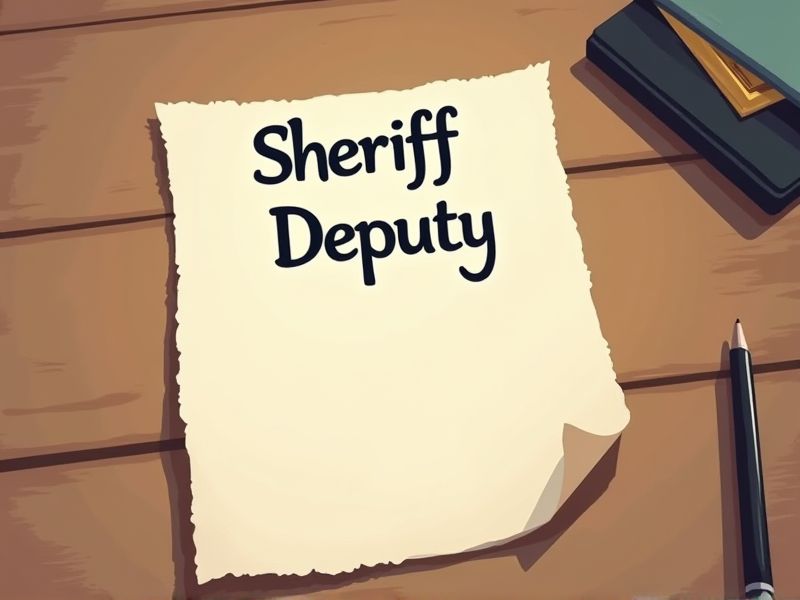
The role of a Sheriff Deputy necessitates specialized skills to effectively maintain law and order. Certifications ensure deputies are equipped with the necessary legal knowledge, tactical expertise, and first response skills. They also validate the deputy's ability to handle diverse situations responsibly, ensuring community trust and safety. Here are crucial certifications required for a Sheriff Deputy.
Basic Law Enforcement Training Academy Certification
Basic Law Enforcement Training Academy Certification equips sheriff deputies with essential skills necessary for public safety and law enforcement duties. It provides comprehensive education on criminal law, arrest tactics, and emergency response, ensuring deputies are prepared for diverse scenarios. Certification standardizes training, creating consistency and professionalism within law enforcement agencies. Meeting certification requirements enhances accountability and trust between deputies and the communities they serve.
Firearms Proficiency Certification
Firearms Proficiency Certification ensures that a sheriff deputy can handle weapons safely and responsibly, reducing the risk of accidental harm. It verifies that the deputy possesses the necessary skills for effective use of firearms in high-pressure situations, maintaining public safety. Certification programs often include scenario-based training, allowing deputies to respond appropriately in diverse real-world environments. Regular recertification maintains high standards of proficiency and adapts to evolving law enforcement challenges and technologies.
Defensive Tactics Certification
Obtaining a Defensive Tactics Certification ensures that a sheriff deputy is equipped with the skills necessary to handle confrontational situations safely, reducing the risk of injury to both the officer and the public. The certification provides deputies with standardized techniques, which is crucial for maintaining consistency and professionalism across the department. Sheriff deputies often encounter high-stress scenarios where split-second decisions are necessary; this certification enhances their ability to react appropriately. The evolving nature of threats and encounters in law enforcement necessitates continuous education and training, reinforcing the importance of the certification for effective duty performance.
First Aid and CPR Certification
Sheriff deputies frequently encounter emergencies where administering first aid and CPR can save lives. Their certification ensures they are equipped to handle medical situations until professional medical help arrives. Knowledge of first aid and CPR increases the likelihood of positive outcomes in critical incidents. Certification also builds public trust, as the community is reassured that deputies can provide competent emergency care.
Emergency Vehicle Operation Course (EVOC) Certification
The EVOC Certification is required for Sheriff Deputies to enhance their driving skills under high-pressure situations, reducing the risk of accidents during emergency responses. Having this certification demonstrates a Deputy's knowledge in maneuvering vehicles safely through various terrains and conditions, crucial for effective law enforcement duties. With EVOC training, Sheriff Deputies are better equipped to make quick and informed decisions while in pursuit or when responding to distress calls. Ensuring Deputies hold this certification can lead to lowered liability and improved public safety outcomes.
Use of Force Continuum Certification
Sheriff deputies face evolving situations that require precise judgment, and Use of Force Continuum Certification provides structured guidelines to handle these scenarios effectively. Certification ensures deputies are trained to escalate force appropriately, minimizing harm and preventing misuse of power. Legal and ethical standards mandate that law enforcement personnel possess verified competency in using force, protecting both officers and the public from excessive force incidents. This certification builds trust within the community by demonstrating a commitment to responsible and accountable law enforcement practices.
Crisis Intervention Team (CIT) Certification
Crisis Intervention Team (CIT) Certification equips Sheriff Deputies with skills to manage situations involving individuals with mental health challenges, reducing the likelihood of escalation. Data shows that trained officers are more effective at de-escalating potentially volatile encounters, leading to fewer injuries and use-of-force incidents. Certification enhances deputies' ability to connect individuals with appropriate mental health resources, which can diminish repeat incidents and prevent future crises. Implementing CIT training fosters community trust and confidence in law enforcement, as it demonstrates a commitment to addressing mental health issues responsibly.
Legal and Ethics for Law Enforcement Certification
Legal and Ethics for Law Enforcement Certification ensures that Sheriff Deputies understand and comply with constitutional rights and legal frameworks, minimizing the risk of civil liberties violations. This certification builds public trust by fostering transparency and accountability in law enforcement practices. Improved knowledge in legal matters aids in informed decision-making, reducing the likelihood of litigation and reputational damage. Comprehensive ethical training enhances the deputies' capacity to handle complex, morally challenging situations effectively.
Communication and De-escalation Techniques Certification
A Communication and De-escalation Techniques Certification equips sheriff deputies with skills to manage confrontational situations safely, reducing potential harm. Training in these techniques enhances deputies' ability to resolve conflicts without resorting to force, promoting trust within the community. Certified deputies can make informed decisions during high-pressure situations, improving overall public safety outcomes. Without proper communication and de-escalation skills, the likelihood of incidents escalating into violence increases, which can have negative implications for community relations and officer safety.
Cultural Diversity and Sensitivity Training Certification
Sheriff deputies interact with diverse communities, requiring cultural sensitivity to effectively maintain public trust and ensure equitable law enforcement. Training in cultural diversity equips deputies with the skills to recognize and mitigate potential biases, reducing the likelihood of conflict or misunderstanding. Enhanced understanding of different cultural norms and values can lead to more compassionate and successful community policing efforts. Certification in cultural sensitivity promotes a department-wide commitment to inclusivity, strengthening community relations and improving overall public safety.
Summary
When you, as a reader, understand the significance of certifications for a Sheriff Deputy, you'll anticipate improved law enforcement proficiency. Enhanced skills and knowledge contribute to more effective community policing and safety initiatives. Gaining certifications often leads to career advancement opportunities for deputies. Consequently, public trust and community relations are likely to improve due to higher professional standards.
